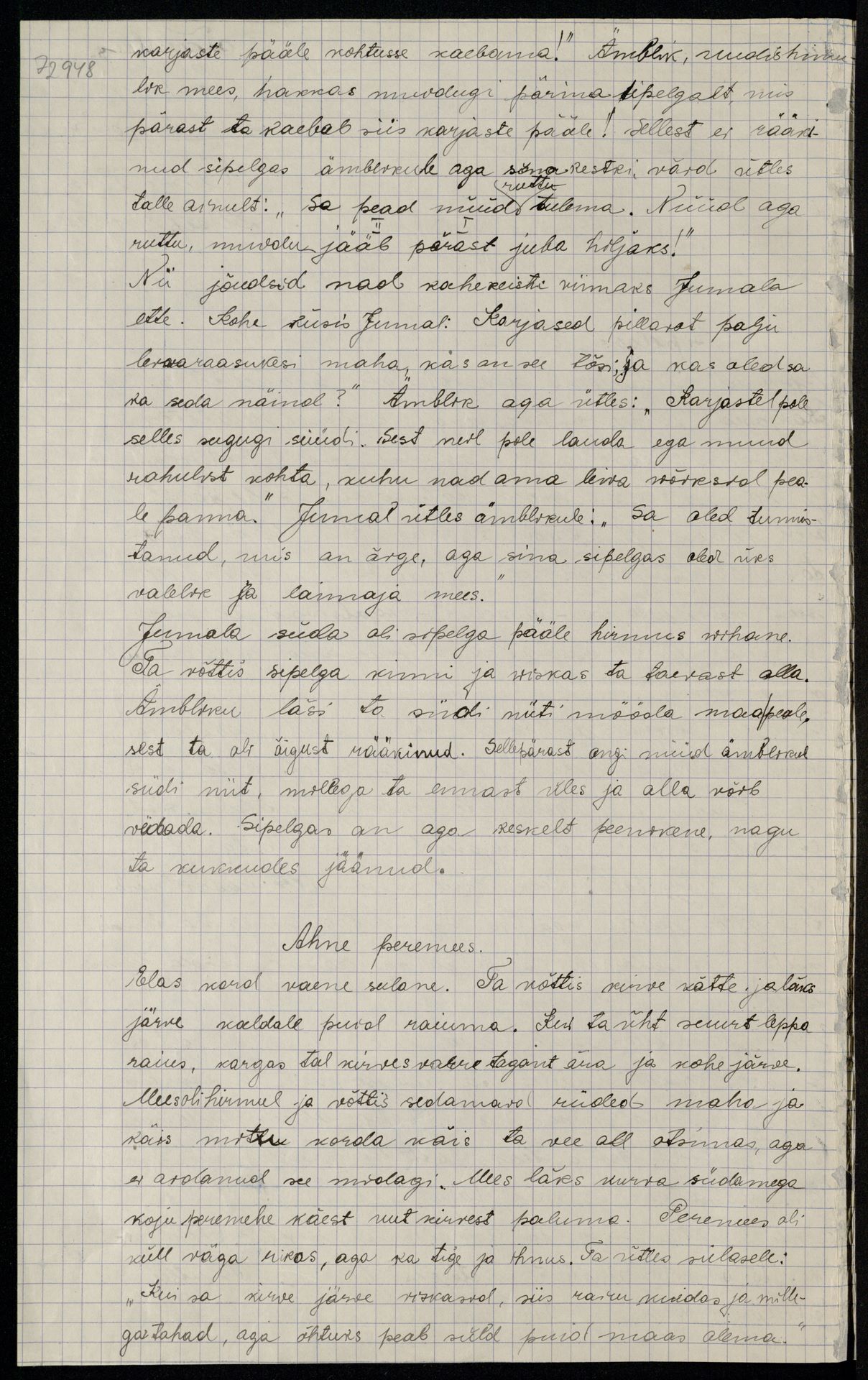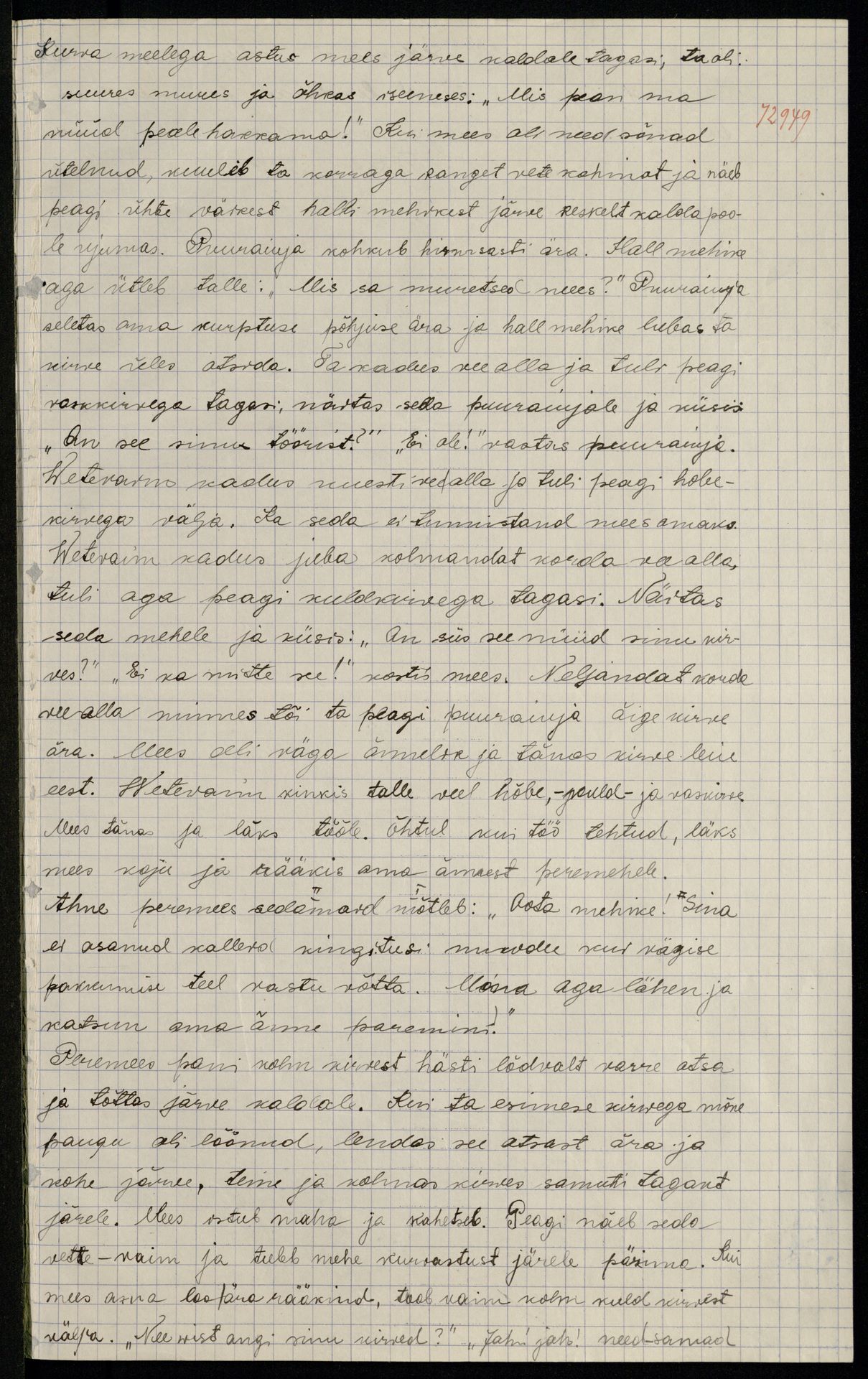Water spirits
When fishermen go to catch fish, they cut a hole in the ice on the lake, and they must pour a little bit of vodka from a bottle into the hole, then drink some themselves. This is said to please the water spirit, and it will send many fish to the hole.
Kui kalamehed kalu püüdma lähevad, augu järve peal jää sisse raiuvad, peavad nad pudelist veidikese viina järve auku valama, ja pärast ise ka jooma. Siis olevat veevaimul hea meel ja ta laskvat palju kalu augu juurde tulla.
If the fishing catch was good, one fish was thrown back as an offering to the Sea God.
Kui oli kalal olles hää saak, siis visati üks kala tagasi merejumalale ohvriks.
If the Sea Elder was seen while out at sea, they tried to quickly sail to shore, as no good was to be expected then.
Kui merel olles mere vana nähtud, siis katsutud ruttu randa sõita, sest siis polnud nalja oodata.
If the fishing catch at sea was good, some fish were thrown back into the sea, and the Lord's Prayer was recited. The fish were thrown back to entice the water spirit.
Kui merel kalasaak hea oli, siis visati mõned kalad tagasi merde ja loeti Issameie palvet. Kalad visati merde tagasi veevaimu meelitamiseks.
Before fishing, offerings were made to the sea god to ensure a good catch. Wool, fishing tackle, and other items were sacrificed to the Sea God.
Enne kalastamist ohverdati merejumalale, et siis saada hea kalasaagi. Merejumalale ohverdati villu, püüseid ja muid asju.
In the lake lived the Lake God, who provided the fish catches.
Järves elas järvejumal, kes andis kalasaake.
Once there lived a poor farm hand. He picked up an axe and went to the lake shore to chop wood. When he cut down a large alder tree, his axe head jumped off the shaft and immediately fell into the lake. The man was scared and took off his clothes and searched under the water several times, but it didn't help. The man went home with a sad heart to ask his master for a new axe.
The owner was very rich, but also mean and miserly. He said to the servant: "If you threw the axe into the lake, cut however you want and with whatever you want, but by evening a fathom of wood must be on the ground."
Sadly the man went back to the shore of the lake; he was in great distress, and sighed to himself, "What am I to do now!"
When the man had said these words, he suddenly heard a loud roar of water, and presently he saw a little grey man swimming towards the shore from the middle of the lake.
The woodcutter was terrified, but the grey man said to him: "What are you worried about, man?"
The woodcutter explained the reason for his sadness, and the grey man promised to look for his axe. He disappeared under the water and soon came back with a copper axe. He showed it to the woodcutter and asked: "Is this your tool?"
"No!" replied the woodcutter. The water spirit disappeared under the water again and soon came out with a silver axe. The servant did not recognize this either. The water spirit disappeared under the water for the third time, but soon returned with a golden axe. He showed it to the man and asked: "So is this your axe?"
"Nor is it!" answered the man. Going under the water for the fourth time, he soon brought up the woodcutter's right axe. The man was very happy and thanked for finding the axe. The water spirit also gave him silver, gold and copper axes. The servant thanked him and went to work.
In the evening, when the work was done, the man went home and told his master about his luck. The greedy master was thinking this: “Wait, man! You could not accept expensive gifts except by forceful offer. But I'll go and try my luck better."
The master put the three axes very loosely on the end of the shaft and rushed to the shore of the lake. When he had made a few blows with the first axe, it flew off the end and immediately into the lake, followed by the second and third axes as well. The master sat down and expressed regret. Soon the water spirit saw it and came to inquire about the man's sadness. When the master finished telling his story, the spirit brought out three golden axes.
"I guess those are your axes?" he asked.
"Yes! Yes! Those are my axes!" the master answered. And with that, the water spirit disappeared. A loud roar and flecks of foam flew into the owner's face. Soon, however, everything is quiet and the master wakes up as if from a dream.
He hurried towards home, and would never dare to set foot by the lake again.
Elas kord vaene sulane. Ta võttis kirve kätte ja läks järve kaldale puid raiuma. Kui ta üht suurt leppa raius, kargas tal kirves varre tagant ära ja kohe järve. Mees oli hirmul ja võttis sedamaid riided maha ja käis mitu korda ka vee all otsimas, aga ei aidanud see midagi. Mees läks kurva südamega koju peremehe käest uut kirvest paluma.
Peremees oli küll väga rikas, aga ka tige ja ihnus. Ta ütles sulasele: „Kui sa kirve järve viskasid, siis raiu, kuidas ja millega tahad, aga õhtuks peab süld1 puid maas olema.“
Kurva meelega astus mees järve kaldale tagasi, ta oli suures mures ja õhkas iseeneses: „Mis pean ma nüüd peale hakkama!“
Kui mees oli need sõnad ütelnud, kuuleb ta korraga kanget vetekohinat ja näeb peagi ühte väikest halli mehikest järve keskelt kalda poole ujumas. Puuraiuja kohkub hirmsasti ära. Hall mehike aga ütleb talle: „Mis sa muretsed, mees?“
Puuraiuja seletas oma kurbtuse põhjuse ära ja hall mehike lubas ta kirve üles otsida. Ta kadus vee alla ja tuli peagi vaskkirvega tagasi, näitas seda puuraiujale ja küsis: „On see sinu tööriist?“
„Ei ole!“ vastas puuraiuja. Vetevaim kadus uuesti vee alla ja tuli peagi hõbekirvega välja. Ka seda ei tunnistand mees omaks. Vetevaim kadus juba kolmandat korda vee alla, tuli aga peagi kuldkirvega tagasi. Näitas seda mehele ja küsis: „On siis see nüüd sinu kirves?“
„Ei ka mitte see!“ kostis mees. Neljandat korda vee alla minnes tõi ta peagi puuraiuja õige kirve ära. Mees oli väga õnnelik ja tänas kirveleiu eest. Vetevaim kinkis talle veel hõbe-, kuld- ja vaskkirve. Mees tänas ja läks tööle.
Õhtul, kui töö tehtud, läks mees koju ja rääkis oma õnnest peremehele. Ahne peremees mõtleb sedamaid: „Oota, mehike! Sina ei osanud kalleid kingitusi muidu kui vägise pakkumise teel vastu võtta. Mina aga lähen ja katsun oma õnne paremini.“ Peremees pani kolm kirvest hästi lõdvalt varre otsa ja tõttas järvekaldale. Kui ta esimese kirvega mõne paugu oli löönud, lendas see otsast ja kohe järve, teine ja kolmas kirves samuti tagant järele. Mees istub maha ja kahetseb. Peagi näeb seda vetevaim ja tuleb mehe kurvastust järele pärima. Kui mees oma loo ära rääkind, toob vaim kolm kuldkirvest välja.
„Need vist ongi sinu kirved?“
„Jah! Jah! Needsamad ongi minu kirved!“ Sedamaid kadus veevaim ära. Kange kohin ja vahutükid lendavad peremehele vastu nägu. Varsti on aga kõik vaikne ja mees ärkab kui unest üles. Tõttab nüüd kiirel sammul kodu poole.
Iialgi ei julgend ta oma jalga enam järve ääre viia.
1 süld – pikkusmõõt, ~2 m
Upon leaving the sauna, thanks were given:
Thank you, Water Father,
thank you, Water Mother,
thank you, Mother Mary!
Saunast lahkudes tänati:
Aituma vee isakesele,
aituma vee emakesele,
aiuma Maarja emakesele!
There is some kind of whirlpool in the water (in a lake or elsewhere). If you happen to get there, the Nixie drags you in.
Vees on (järves või mujal) mingisugune keeris. Kui sinna juhtud, tõmbab näkk sisse.
You must not look into the well, the fairy might pull you in.
Kaevu ei tohi vaadata, aldjas võib kaevu tõmmata.
A man caught a tailless fish. From the lake, a voice called after him: 'Bring me back our bobtail hog!' It was the Lake Keeper or the Lake Elder who called. The tailless fish was not an ordinary fish, but a nixie
Mees püüdnud sabata kala kinni. Järvest hüütud talle järele: "Too me tölpsaba orikas tagasi!" See oli järve hoidja või järve vanamees, kes hüüdis. Sabata kala ei olnud harilik kala, vaid näkk.
Once, a man was fishing on the lake and didn’t catch more than a single fish that day. He cleaned and salted it in the evening. But at night, the man wasn’t allowed to sleep; he kept hearing the same words over and over: 'Take back our bobtail hog!' He wasn’t given any peace until he threw the pieces of the fish back into the lake.
Ühe korra püüdnud üks mees järvel kala ja ei ole sellel päeval rohkem saanud kui ühe ainukese. Sellegi rookinud õhta ära ja pannud soola. Öösel ei ole aga meest kuidagi magada lastud, vaid ööldud vaid ühtelugu: „Vii meie tömpsaba orikas ära!“ Ja talle ei ole enne rahu antud, enne kui ta need kalatükid jälle järve visanud.
Instrumental song on Estonian folk instrument kannel. Waltz.
Pillilugu kandlel. Valss.



